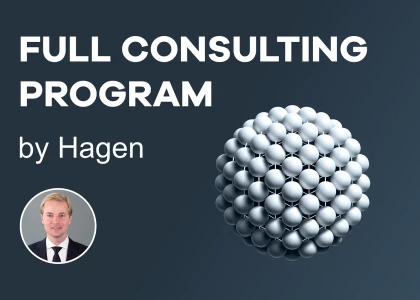I can not catch up with what the interviewer is saying, I fee intevieres are speaking fast or I am a bit slow, espcial whne it comes to the math question, I really had to ask them to repaeat many points, how can I overcome this?
I can not catch up with what the interviewer is saying


Hi there,
I would be happy to share my thoughts on your situation:
- First of all, I would advise you to practice active listening and note taking skills so you can follow interviewers better.
- Moreover, it is okay to politely ask interviewers to repeat or explain if you don't understand.
You can find more on this topic here: How to succeed in the final interview round.
If you would like a more detailed discussion on how to best prepare for your upcoming interviews, please don't hesitate to contact me directly.
Best,
Hagen

Hey!
To overcome this, practice with a coach or mock interviews to get comfortable with the pace and structure of case interviews. Also, don't hesitate to ask the interviewer to repeat or clarify points—it's better to understand the question than to rush fully. With practice, you'll improve your speed and confidence!
Good luck! Alessa

Hi there,
you need to practice live interviews with a case partner or a coach so you can practice reacting to a prompt that is given to you verbally rather than in writing. If you don't understand something the first time around, ask clarifying questions. That is actually expected from you.
Best

Hi there,
Q: I cannot catch up with what the interviewer is saying, how can I overcome this?
You can find a few tips below:
- Ask the interviewer to repeat it in case you missed some information. If the piece of information is critical to understanding the rest of the prompt, I would recommend doing so right away and avoiding waiting until the end of the prompt.
- Use abbreviations for your notes. For example, for revenues use R, for costs use C, for increase use ⬆, etc.
- Write down essential information only. You won’t have time to write down every single word; therefore, focus on key information only. If you have a client that produces steel with four plants and a revenue problem, your notes could be something like: Steel producer, R ⬇, 4 plants.
- Do a recap after the prompt. This ensures you took notes correctly; the interviewer will correct you if you repeat something wrong.
Good luck!
Francesco

Hi there! I echo what the other coaches (great tips) will add a few additional tactical suggestions and ways to practice beyond mock interviews.
- Chunking Information: For visual learners (like me), grouping related data into chunks on your notepad can help. Instead of writing each number separately, categorize them under headings like “Revenue” or “Costs.” This organization helps create a visual structure that makes it easier to process and remember the data throughout the case.
- Visual Mapping: Create diagrams or flowcharts as you receive verbal information. For instance, draw a quick graph or use boxes and arrows to connect related figures. This is helpful when data is shared along process steps (e.g., cost breakdown, steps in a manufacturing process, etc.).
While live practice with coaches and peers will be your best simulation for game time, here is what you can do to get high-quality prep:
- Listen to case interviews on YouTube: look up case interviews with solid reviews and the highest number of views, listen to prompt/structure, and focus your practice on taking down notes on qualitative information. If you want to challenge yourself, play in on 1.25x or 1.5x speed.
- Listen to business podcasts: find a quick and fun business podcast to subscribe to (e.g., The Best One Yet Podcast), listen to it daily, and take mental (or physical notes) as you hear data presented)
As a visual learner myself, I struggle to process verbal information if it's presented too quickly or in a disorganized fashion. I have also communicated that with my teams, and we often would walk up to a whiteboard and work through the problems together. Don't be afraid to speak up politely, and ask your interviewer to slow down, repeat themselves, or give you a moment to process the information just shared. Good luck!

Hi there,
I would argue its two things you can do:
- Note taking: Find a note-taking format that works for you (abbreviations, symbols etc)
- Practice: Live-practice or recorded drills are the way to go to practice this skill and become faster
It's also okay to sometimes ask clarification questions in case you have missed something.
All the best,
Florian

Hello there,
If this problem is specific only to case interviews, you should:
- Immerse yourself in more live case interview prep sessions
- Take notes with abbreviations and schematics rather than writing full forms
- Request another take immediately your interviewer makes an unclear point
- Try to speak at the pace you’d like to be spoken to, with a respectful slight nudge to the interviewer to speak slower if too fast
But if this issue is not isolated to case interviews, in addition to the above, you need to expose yourself more to varying speeds of speech (e.g. playing a business podcast at 1.5x speed) so you can get used to faster speakers.
Feel free to reach out for any additional tips.
All the best,
Fathu

Hi,
I think this is something that you need to practice. Try and get someone to drill you in listening drills and to practice your note taking.
All the best!














